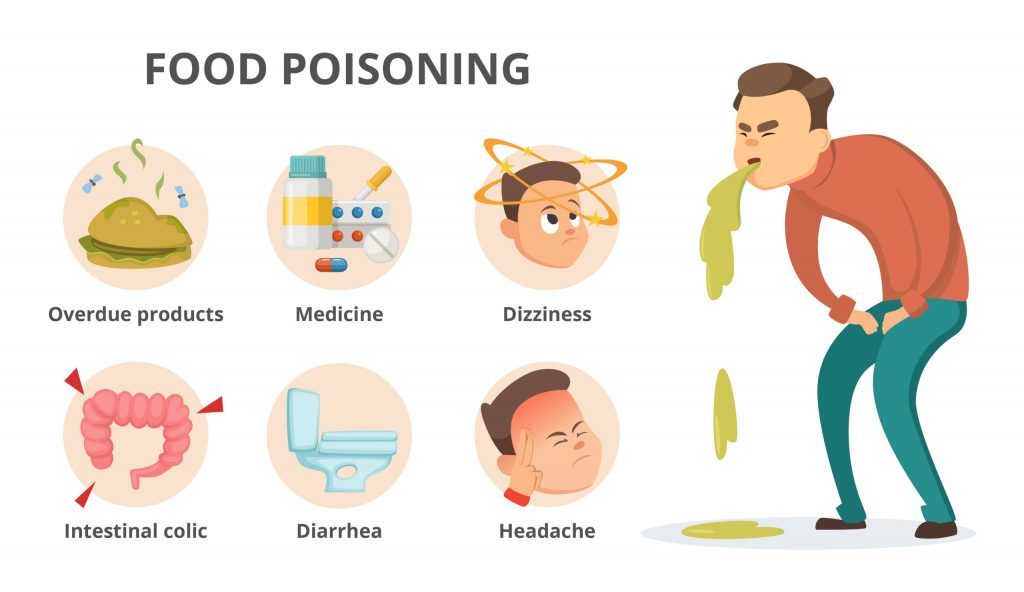Food Poisoning: Causes & Symptoms

Food poisoning is a widespread illness throughout the country. Caused by the contamination of food sources by bacterial infiltration, it is easily mitigated by proper food preparation and storage. Listed below are some of the common causes and symptoms
Causes of Food Poisoning
Contamination may occur during any stage of a food’s production through to cooking. The primary source of food poisoning is under-cooked food; meats such as chicken can quickly become contaminated if not cooked thoroughly. Check the temperature of the meat before serving can reduce the risk of contamination.
Food poisoning may also be caused by food that has not been stored properly. Care must ensure that all products are held at the necessary temperature to avoid bacteria growth. Furthermore, it is recommended that cooked food be moved quickly to the fridge to prevent the development of harmful bacteria.
Cross-contamination, another cause of food poisoning, occurs when bacteria is spread between food and other objects. This commonly occurs when meat is prepared on a board, then used to prepare other items. Be careful when storing raw meat in the fridge; if the juices are allowed to drip onto other foods, then these may become contaminated.
Bacteria Sources of Food Poisoning
There are several familiar bacteria sources that can lead to food poisoning, including:
- Salmonella
- Listeria
- Campylobacter and
- E Coli
Salmonella
This bacterium is usually found in raw or undercooked chicken or other meats and may also be found in eggs, cheese, and unpasteurized milk. A small portion of those suffering from salmonella poisoning may develop Reiter’s syndrome. Although uncommon, this can cause joint stiffness and pain and may develop into chronic arthritis.
Listeria
A bacteria source is found in refrigerated, ready-to-eat foods, which may be in the form of prepackaged sandwiches and bagels, butter, cheese, or prepackaged sandwich meats.
Campylobacter
One of the most common bacteria sources, which may lead to food poisoning, is typically found in raw or undercooked meats such as chicken.
Escherichia coli
E. coli is a bacterium found in the digestive systems of most mammals. Most cases of E. coli poisoning arise from the consumption of undercooked beef (burgers, meatballs, etc.). In comparison to other sources of food poisoning, symptoms may not appear in an individual for up to two weeks.
Symptoms of Food Poisoning
Food poisoning symptoms vary between each person and the source of contamination. The localized concentration of bacteria will also be a determining factor of symptoms. With that said, there are several signs to look out for, particularly after coming into contact with potentially dangerous food sources:
- Sickness and diarrhea
- Nausea
- Upset stomach
- Abdominal pain/cramps
- Fever
Symptoms of food poisoning may begin to show as early as two hours after consumption. However, in most cases, they take one or two days before they come to the forefront. With particular sources of contamination, such as E. coli, the symptoms may not be visible until up to two weeks following exposure to the bacteria.
Most bouts of food poisoning usually disappear within a few days without any treatment. However, there are times when seeking urgent medical attention is required:
- Blood present in stool
- Continuous vomiting, inability to keep fluids down
- Constant fever
- Chronic dehydration
- Impaired vision
Although food poisoning is a relatively mild condition, it can cause significant discomfort for the sufferer and may be problematic if not treated. As it is a preventable illness, practicing good food hygiene when handling, preparing, and cooking food will dramatically reduce the chance of contraction. As with any disease, if the symptoms do not disappear within seven days or cause severe discomfort, professional medical advice should be sought immediately.
Trending Health Topics
- ADHD
- Allergies
- Arthritis
- Bipolar Disorder
- Bunions
- Car Accidents
- Chron's Disease
- Common Cold
- COPD
- Depression
- Dry Skin
- Dry throat
- Eczema
- Fungal Infection
- GERD
- HIV/AIDS
- Hypertension
- Irritable Bowel Syndrome (IBS)
- Multiple Sclerosis
- Osteoarthritis
- Psoriasis
- Rheumatoid Arthritis
- Skin Disorders
- strep throat
- Type 2 Diabetes
- Uncategorized